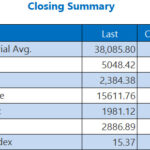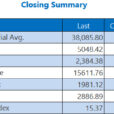
Instead of being defeated by the political upheavals in Lebanon, the nation’s leading financial institution has acquired valuable banking lessons from repeated domestic crises as it embarks on a second wave of growth beyond its home borders. Blom Bank is parlaying its historic reputation for low-risk, innovative trade finance into full-service operations in some of the fastest-growing, most promising regions in the world.
Liquidity highly-prized
In troubled times, as Beirut-headquartered Blom Bank has learned, liquidity is the secret to survival and prosperity. Like other financial institutions in Lebanon, it maintains levels of reserves that most western-based banks would regard as ultra-cautious. But Blom Bank’s chief executive Saad Azhari is not apologising. “We maintain very high levels of liquidity because of the unstable situation,” he says. “The banking industry here is very conservative in general, far more so than any other region. Actually, the banking system is very strong. It has to be because the economy depends on it.” Also, as the market leader Blom Bank clearly feels an obligation to set the standard.
Thus Blom Bank’s own internal guidelines are tougher than those laid down by the central bank, the Banque du Liban. For instance, the rules require that 15 per cent of deposits are liquid. Nor are banks permitted to invest in foreign bonds below investment grade. Also there are specific rules for investment by geography with certain countries being rated higher-risk than others. At home, lending to higher-capitalised companies scores higher marks than to lower-rated corporates.
However Blom Bank, which changed its name in 2001 from the Banque du Liban et d’Outre-Mer, maintains higher levels domestically as well as internationally. As extra security, it stores funds with foreign banks against emergencies. “We respect the central bank’s guidelines. There are very strict provisioning requirements,” summarises Mr Azhari. “But we are tougher with our own”.
A platform for expansion
The institution’s hard lessons in crisis management have helped pave the way for a new era of offshore development. Blom Bank has always been outward-looking – it opened a branch in Jeddah, Saudi Arabia – as early as 1952, just one year after it was first established at home. In part because of its expertise in trade finance, Blom Bank expanded beyond its borders in the seventies and eighties. However this was mainly in Europe in order to service the commercial and private banking needs of expatriate and travelling Arabs and Lebanese. Jointly with Swiss and Arab shareholders, it opened a branch in Paris (Banorabe) in 1976, followed by offices in Geneva (Banque Banorient) in 1979, in Muscat in 1982 and in London in 1983. These were niche banks, at least until recently.
But now that restrictions on entry have eased, it is hanging its shingle out in the Middle East and the Gulf regions. The latest phase of expansion started with a branch in Syria in 2004 where only state-owned banks had been permitted, and quickly followed with three new branches in Jordan. Four years later, Blom Bank is moving rapidly to a full-service operation in both countries. In Syria, for instance, it already offers corporate and retail services, has won permission to open an insurance business, and has applied for a share-broking licence.
At the latest count, Blom Bank had opened three new branches in Jordan since last year, doubling the size of the network. In Syria, it now has 11 branches and plans to open another seven between now and early 2009.
“We are always looking to expand overseas,” explains Mr Azhari. “It is very good for us now that these markets are opening up. We have the lowest cost-to-income operation in Lebanon and we are finding we can replicate our systems and format in these new countries.”
Rapid turnaround in Egypt
Normally a notoriously difficult banking market for foreign investors, Egypt underscores Mr Azhari’s point. Blom Bank was not permitted to open a new office there because of an embargo on the issue of licences, so in late 2005 it bought the loss-making MISR Romanian Bank. The business was turned around within the first six months of Blom Bank’s ownership and posted a €6.9m profit in 2006. That was followed by a €12m profit last year and will be much higher this year. As in Syria, the renamed Blom Bank Egypt is moving quickly to a full-service operation with a fast-expanding branch network. In the 12 months to June, the Egyptian bank opened 13 new branches to give it a total of 23.
Encouraged by success in Egypt, Blom Bank will open in Saudi Arabia before the end of the year, in Qatar by October, and has applied for a licence in Algeria. At first it will operate under limited licences in these places, but the institution has bigger ambitions. “We are probing for opportunities all the time,” adds Mr Azhari. “We are gradually heading for full-service operations across the Levant.” The overall expansion strategy is based on building business in countries that the bank considers low-risk while offering high potential for growth.
Simultaneously, the bank has steadily rebranded its far-flung empire under the Blom Bank name as it brings all its offices under the one wholly-owned roof.
Innovative trade finance
“The maximum security with the minimum risk” is how Mr Jacques Sabounji, long-serving senior manager of trade finance, describes Blom Bank’s long-held principle in facilitating cross-border deals. Although the institution runs full-service operations at home and abroad, its trade finance division has long been regarded across the Middle East as a standard-bearer in innovation. In the financial year ending March 2008, it posted more than half a billion dollars in volume of transactions. The bank’s trade finance portfolio extends to all kinds of transactions in the ten Middle East nations where it is active – documentary credits, letters of guarantee, collections, back-to-back financing, factoring, forfeiting and other technicalities of the world’s oldest banking skill.
Much of the bank’s trade-financing expertise is put to use in arranging deals between Lebanon and fast-growing manufacturing nations such as South Korea and China which are the source of a steady flow into Lebanon of all kinds of goods from vehicles to consumer durables. Many of these arrangements are complex, requiring detailed knowledge of the goods concerned as well as of shipping, finance, insurance and other arrangements. Typically, Mr Sabounji’s department takes into account not only the technicalities of trade finance but broader risk-based issues such as sovereign exposure, customer’s liquidity, the viability of the transaction, market competitiveness and international pricing norms. Hardly surprising then that Blom Bank’s authority on trade finance is in demand all over the region. Mr Sabounji provides advice to governments and lectures at universities.
IT platform underpins deals
Blom Bank is rolling out a new IT trade financing strategy that is designed to minimise operational risk to the contracted parties as well as to itself. The IT platform will in time be made available to customers in a measure designed to speed up processing and enhance the accuracy of contracts.
One reason for investing in advanced IT programmes is that the total sums involved have been steadily mounting. One recent contract was to finance a €31m deal to import cars from South Korea.
Ever more innovative arrangements are required, especially as the credit crunch reduces the availability of debt and raises doubts about the liquidity of counter-parties. A truck-importing deal illustrates the challenges. As Blom Bank sources explain, the bank was asked to confirm a letter of credit for €5m on September 1, 2007, bearing a validity date of May 30, 2008. The letter stipulated multiple shipments with 90 percent of the payment made on sight, the remaining 10 per cent against the presentation of the commissioning certificate. However the bank intervened to rewrite the letter of credit to help its customer’s liquidity. Thus the customer ended up with an advance payment representing 17 percent of the letter of credit’s total, equal to around €0.9m. The rest of the total was paid 73 percent on sight, 10 per cent against delivery of the commissioning certificate.
In all these transactions involving the delivery of capital products, the role of the middle-man is paramount. “The key is that both parties have total confidence in the intermediary,” explains Mr Sabounji.
Biggest and most profitable
Now well into its third consecutive decade as Lebanon’s largest financial institution, Blom Bank is not neglecting its home base. By early 2009, it will add another six branches there for a total of 56.
It also firmly established itself as Lebanon’s most profitable bank, despite sky-high provision for liquidity. Last year it posted net profits of €130m with a return on equity of 15.65 percent, a ratio that would more than please many beleaguered western banks right now. The other numbers would also make them envious. Blom Bank’s cost-to-income stands at just over 34 percent, more than 10 percent better than nearest rival Byblos with 46.7 percent. The bank certainly won’t have a Lebanese version of the subprime crisis – its lending guidelines are more than responsible with only gold-plated borrowers getting 90 percent of a residential property’s value. In fact, 50 percent is more common.
Its sharebroking business dominates the Beirut Stock Exchange with 24 percent of all transactions. And the bank has shouldered its share of sovereign liquidity obligations – in early 2007 it successfully lead-managed the first government bond offering following the disruptions in capital markets of the July 2006 war.
Corporate deals on the up
Corporate financing is taking off despite the obvious challenges in the domestic commercial sector. Domestically, Blom Bank funded 24 project-finance deals last year for a total €339m. Its corporate loan portfolio is bounding ahead, rising by nearly 22 percent a year, and now stands at €0.7bn. An Islamic subsidiary, Blom Development Bank, has been launched to deliver tailored solutions to customers with religious borrowing principles.
Meantime Blom Bank builds on its growing international presence with landmark corporate deals; earlier this year it completed the first M&A transaction between Lebanese and Egyptian non-financial institutions. It is likely similar synergies will emerge between Blom Bank’s home and international operations as its expansion gathers pace.
For further information tel +96 1174 3300; email blom@blom.com.lb; www.blom.com.lb










